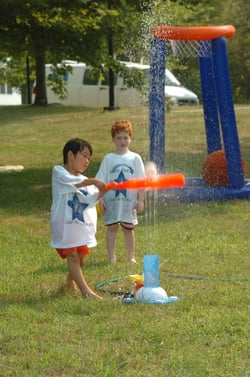Are you over-the-top excited about signing your little slugger up for t-ball? Maybe you can’t wait until your pint-sized player starts soccer? If you’re wondering what age is old enough for a child to start sports, the answer isn’t exactly clear-cut.
Developmental Differences
Not every child develops at the same rate. Your 4-year-old may not be at the same physical level as your BFF’s preschooler. This means that setting a specific start age for beginning sports isn’t easy. While you’ll need to go by the league’s, team’s or school’s rules for a minimum start age, that doesn’t mean your child has to begin the moment that she hits that magical number. You need to factor in what your child is able to do right now and what you think she can master with instruction.
It’s Not All Physical
Even if your 3-year-old has the physical prowess of a much older child, that doesn’t always mean he’s ready to join the local league. Sports aren’t all about motor skills. Keep in mind that your child needs the attention span to concentrate on the game, social skills to show good sportsmanship, and emotional control to keep her frustration in check when she loses.
By the time that he’s in kindergarten, he should have the basic skills that he’ll need to make it through practices and games without having major meltdowns. That said, some children may need extra time to develop the cognitive, social, and emotional skills necessary to handle organized sports. If this is the case, you can keep working on the physical part of playing sports at home or informally with friends. This gives your child the chance to keep physically fit and become familiar with the game while he is developing and refining the other skills that he needs.
Coordination and Age
Before age 6 your child most likely lacks the coordination to play complex sports. That said, she can start playing sports before she gets to grade school. Many teams and instructional programs have athletic opportunities that are specific for younger children. These help preschoolers to develop the coordination that they’ll need later on.
Instead of expecting your child to use coordinated movements that she’s not ready to, an early childhood sports class or program starts with basics that are age-appropriate. For example, instead of teaching intricate sets of movements, a pre-k karate class may help younger kids learn how to kick forwards or work on stretching exercises.
While your child’s age certainly plays a large role in when she starts sports, don’t forget about his interests and opinions. If your child is resistant to play, back off and don’t push him. There’s no rule that says all kids need to start soccer, softball, or skating the moment that they can stand up and run. Forcing a young child into playing a sport when he would rather run around the backyard isn’t likely to result in a positive experience for anyone. Instead, wait until your child is excited about and engaged in the athletic endeavor. Doing so helps to start a life-long love of physical activity and fitness!











.png)
.png)
.png)
.png)